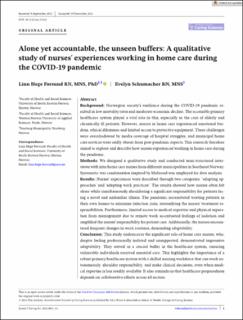| dc.description.abstract | Background: Norwegian society's resilience during the COVID- 19 pandemic re-sulted in low mortality rates and moderate economic decline. The accessible primary healthcare system played a vital role in this, especially in the care of elderly and chronically ill patients. However, nurses in home care experienced emotional bur-dens, ethical dilemmas and limited access to protective equipment. These challenges were overshadowed by media coverage of hospital struggles, and municipal home care services were oddly absent from post- pandemic reports. This research therefore aimed to explore and describe how nurses experienced working in home care during the pandemic.Methods: We designed a qualitative study and conducted semi- structured inter-views with nine home care nurses from different municipalities in Southeast Norway. Systematic text condensation inspired by Malterud was employed for data analysis.Results: Nurses' experiences were described through two categories: ‘adapting ap-proaches’ and ‘adapting work practices’. The results showed how nurses often felt alone while simultaneously shouldering a significant responsibility for patients fac-ing a novel and unfamiliar illness. The pandemic necessitated treating patients in their own homes to minimise infection risks, intensifying the nurses' treatment re-sponsibilities. Furthermore, limited access to medical expertise and physical separa-tion from management due to remote work accentuated feelings of isolation and amplified the nurses' responsibility for patient care. Additionally, the nurses encoun-tered frequent changes in work routines, demanding adaptability.Conclusion: This study underscores the significant role of home care nurses, who, despite feeling professionally isolated and unsupported, demonstrated impressive adaptability. They served as a crucial buffer in the healthcare system, ensuring vulnerable individuals received essential care. This highlights the importance of a robust primary healthcare system with a skilled nursing workforce that can work au-tonomously, shoulder responsibility, and make clinical decisions, even when medi-cal expertise is less readily available. It also reminds us that healthcare preparedness depends on collaborative efforts across all sectors. | en_US |

